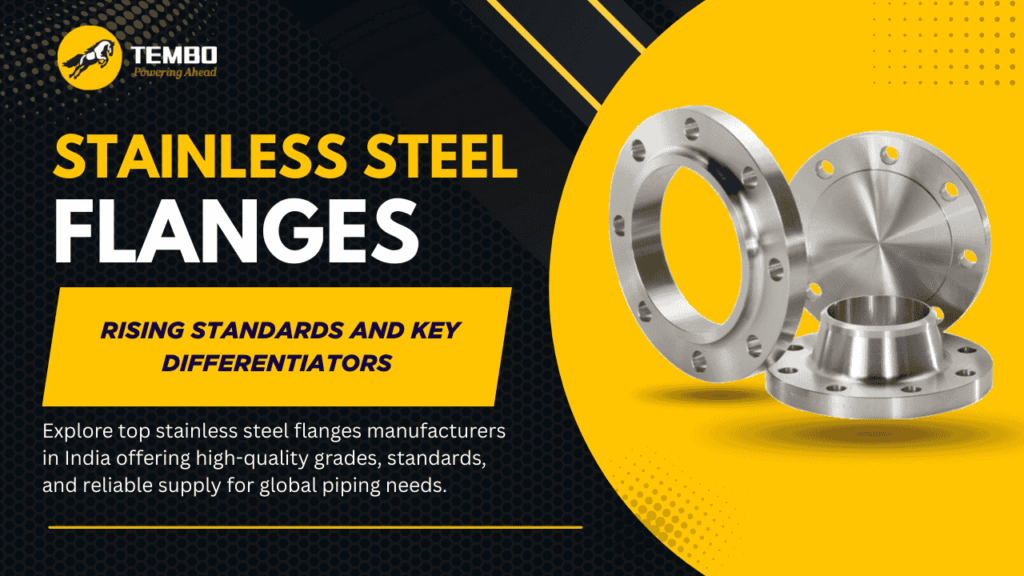
Introduction
Stainless steel flanges are essential components in piping systems across industries like oil & gas, chemical, power plants, shipbuilding, marine, etc. The integrity of piping, leakage prevention, strength under pressure, and corrosion resistance all rely heavily on the quality of flanges. India has many manufacturers of stainless steel flanges, and businesses increasingly prefer Indian suppliers that ensure global standards, quick turnaround times, and competitive pricing.
In this blog, we explore what to look for in stainless steel flanges, what sets top manufacturers in India apart, and why partnering with the right manufacturer matters.
What Are Stainless Steel Flanges?
A flange is a protruding ridge on a pipe, fitting, or other object that allows it to be connected to another object. Stainless steel flanges connect pipes, valves, pumps, and other equipment to form a piping system. They are designed to allow for assembly, disassembly, easy cleaning, inspection, or modification. Grades like 304, 316, 316L, duplex steels, etc., are commonly used because of their corrosion resistance and strength.
Flange types include weld neck, slip-on, blind, threaded, socket-weld, lap joint, reducing, and orifice flanges among others. Choosing the right type depends on pressure, temperature, fluid/media, and environment of use.
Key Attributes of Quality Stainless Steel Flanges Manufacturers in India
Here are the main differentiating attributes of good stainless steel flanges manufacturers in India:
- Material Quality & Grades
The manufacturer should use raw materials from reputable mills. Common grades include SS304, SS316/316L, SS310, duplex and super-duplex steels, and other specialty stainless steels. Alloy composition, finish, and traceability are important. - Certifications & Standards
Compliance with international standards such as ASTM A182, ASME B16.5, ANSI/ASME, EN, DIN, BS, ISO, etc., plus quality certifications (ISO 9001, etc.), ensures reliability. Testing facilities for pressure, spectral analysis, mechanical properties, corrosion, etc., are essential. - Range of Types & Sizes
The ability to manufacture different kinds of flanges (blind, weld neck, slip-on, socket weld, threaded, reducing, lap joint, etc.) in a wide range of sizes and pressure ratings (150#, 300#, 600#, 900#, etc.) adds value. Also the ability to do custom sizes or designs is important. - Finish & Coating
Good surface finish (polished, machined, etc.), precise dimensions, proper flange face types (raised face, flat face, ring joint), proper beveling, etc. Coatings or treatments as needed (for corrosive environments) also matter. - Testing & Quality Assurance
Every flange batch should undergo mechanical tests, pressure testing, dimensional checks, inspection for flatness of flange face, and certification. Traceable documentation matters for critical applications. - Delivery, Capacity & Export Experience
Manufacturers with strong production capacity, experienced in exports, familiar with documentation, and capable of reliable delivery timelines, packaging, and handling will suit both domestic and international buyers.
What Sets the Best Apart — Why These Manufacturers Stand Out
- Custom Capability: Ability to produce specialty flanges or custom dimensions according to client drawings.
- High Pressure & High-Temperature Grade Expertise: Handling flanges for critical services like steam, high-temp fluids, corrosive media, requiring duplex, super-duplex, exotic stainless steel grades.
- Rapid Testing & R&D: Firms that invest in advanced testing & R&D for better material properties (fatigue, corrosion resistance) are preferred.
- Global Supply Chains & Export Readiness: Knowledge of international packing, shipping, import norms, international buyer expectations.
- Service & Support: After-sales service, documentation, traceability, handling customs, customer assistance are important.
How to Choose the Right Stainless Steel Flanges Manufacturer
If you need flanges, here’s a quick checklist:
- Check the material grade needed for your environment (corrosive, high-pressure).
- Confirm that the manufacturer follows relevant standards (ASTM, ASME, ANSI, DIN etc.).
- Look at their range of flange types and size/pressure classes they stock or can manufacture.
- Ask about their testing & certification process.
- Evaluate their ability to customize or handle drawings.
- Consider delivery time, packaging, export capability if needed.
Conclusion
Stainless steel flanges are critical components in piping systems. The reputation of the system depends heavily on the quality, precision, and suitability of the flange. India has many capable manufacturers offering high-quality stainless steel flanges. However, the ones that stand out are those who offer strong compliance to standards, wide range of grades/types, strong quality assurance, export reach, and good customer support. Choosing the right manufacturer will both ensure safety and reduce long-term maintenance and downtime.



With decades of experience, Anabeeb IQ has become the trusted name in HDPE and PVC pipeline manufacturing and supply throughout Iraq. We specialize in providing certified materials for oil, gas, water, and sewer infrastructure, combining modern production technologies with global engineering standards. Our range of pipe fittings and welding equipment ensures perfect connections and high-quality performance. Anabeeb IQ continues to drive Iraq’s industrial growth by delivering sustainable, safe, and efficient piping systems.